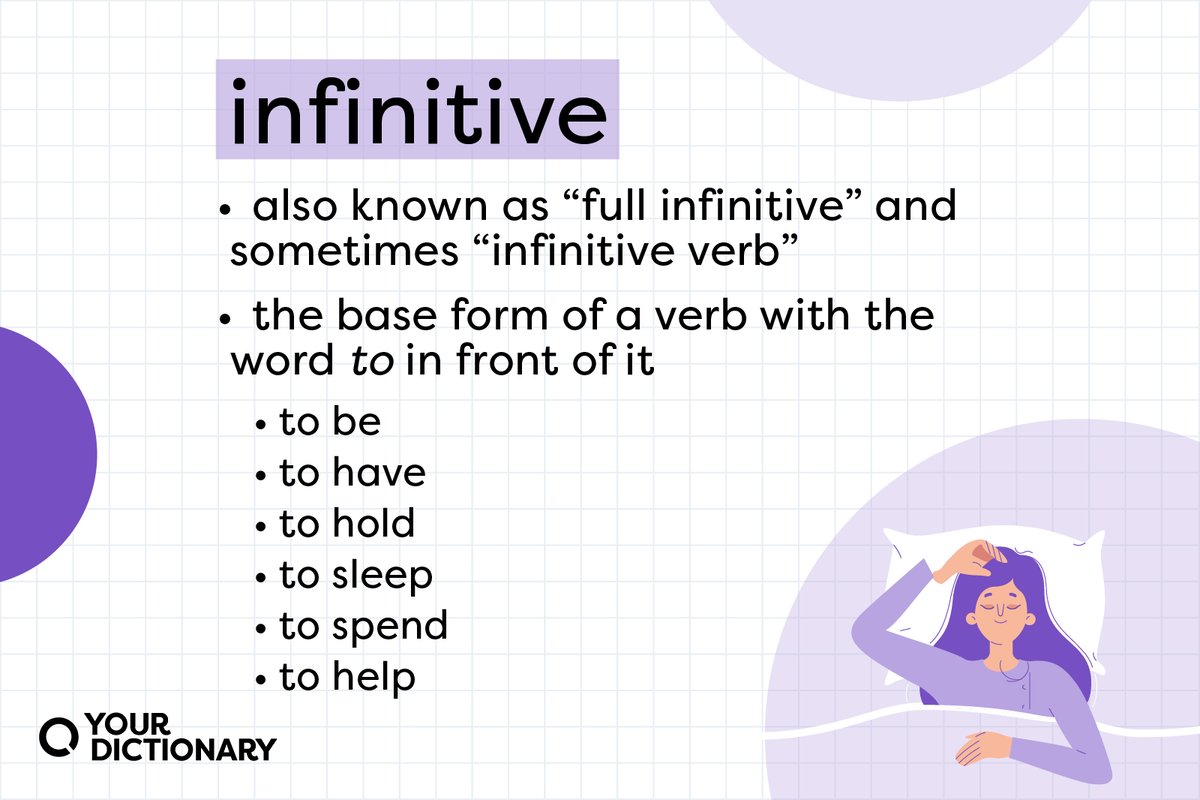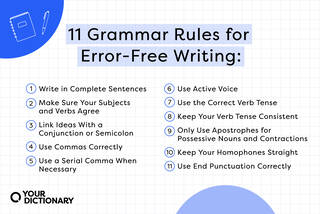
Even though they include a verb, infinitive verbs (typically just called infinitives) aren’t actually verbs. They function as many different parts of speech in a sentence. You can find them everywhere in your daily speech — you just need to look. (Did you see the infinitive there?)
What Is an Infinitive?
An infinitive (also known as a full infinitive or an infinitive verbal) is the base form of a verb with the word to in front of it. You can put any verb in the infinitive form. For example:
- to be
- to have
- to hold
- to sleep
- to spend
- to help
Infinitives can function as a noun, an adjective, or an adverb.
- Paul really wanted to sleep. (Noun as direct object)
- It’s my money to spend. (Adjective modifying the noun money)
- We returned to help. (Adverb modifying the verb returned)
Infinitives are never conjugated with -ed or -ing at the end because they are not used as verbs in a sentence.
They’re one of the three types of verbals, which are verbs used as an adjective, noun, or adverb. The other verbals are gerunds and participles.
Infinitive vs. Infinitive Phrase
Infinitives include to and a verb. Infinitive phrases include more words after the verb to provide detail.
- Paul really wanted to sleep all night.
- It’s my money to spend on what I want.
- We returned to help our friends.

Examples of Infinitive Verbs
How To Use Infinitives
You can use infinitives in several ways. Because they function as nouns, adjectives, and adverbs, they can appear almost anywhere.
Infinitives as the Object of a Sentence
The most common way to use infinitive verbs is as a direct object or an indirect object. When the subject performs an action, the infinitive can answer the question “What?” as the object of that action.
Examples of the above infinitives used as direct objects include:
- I want to be an astronaut. (The verb is want)
- Shane asked to have another hamburger. (The verb is ask)
- The manager promised to hold the job for me. (The verb is promise)
- Try to sleep a little more before our flight. (The verb is try)
- Chuck hopes to spend less than $30 on his haircut. (The verb is hope)
Infinitives as the Subject of a Sentence
Infinitives can appear as another type of noun when they function as the subject of a sentence.
- To play is what I want.
- To swim is what Shane likes.
- To visit is what they promised.
This construction might sound awkward (in which case, you can replace the infinitives with their gerund forms: Playing is what I want, Swimming is what Shane likes, etc.).
Fast Fact
One of the most famous examples of an infinitive as the subject of a sentence is Hamlet’s immortal phrase, “To be or not to be” from Shakespeare’s Hamlet.
Infinitives as Subject Complements
When an infinitive comes after a linking verb like is, it functions as a subject complement to explain more about the subject.
- My dream is to graduate.
- The company’s goal is to expand.
- John’s preference is to leave.
Infinitives that Modify Verbs
When an infinitive modifies a verb or verb phrase, it’s functioning as an adverb. These infinitives tell more about why an action is happening.
(Notice that if you add a silent “in order to” before the infinitive, you can tell that the infinitive is functioning as an adverb.)
- I came to college to learn.
- Sean returned home to change clothes.
- We bought this house to settle down.
Infinitives that Modify Adjectives
Infinitives can also modify adjectives to provide more details in a sentence. In this case they come after the adjective in a sentence.
- I’m happy to help.
- We were ready to sleep.
- Matt was afraid to ask.
Infinitives that Explain “Too” or “Enough”
Adjectives that include the words too or enough require infinitives to fill in the rest of the meaning. Infinitives come after these words in a sentence.
- Chuck is wealthy enough to pay.
- It’s too dark to drive.
- Isla is too tired to study.
Infinitives That Modify Nouns
Sometimes infinitives can function as adjectives themselves. These infinitives describe more about the purpose or function of a noun.
- I need a book to read.
- Mary has a new dress to wear.
- Can I have something to eat?
Negative Infinitives
It’s easy to make infinitives negative in a sentence. Just add the word not before the infinitive.
- We planned to leave early.
- We planned not to leave early.
- Mom asked me to drive.
- Mom asked me not to drive
- Lisa chose to attend college.
- Lisa chose not to attend college.
Sentence Examples of Verbs Followed by Infinitives
You’ve probably seen more infinitives than you think in your everyday reading. Find which common verbs are often paired with infinitives in the chart below.
|
Verb |
Example Sentence |
|
afford |
We can't afford to eat out every night. |
|
agree |
Let's agree to disagree. |
|
aim |
I aim to please. |
|
appear |
She appears to have chicken pox. |
|
arrange |
I'll arrange to meet you at 3:00 |
|
attempt |
We’ll attempt to contact you again. |
|
beg |
She begged to stay up past her bedtime. |
|
care |
Would you care to dance? |
|
choose |
He'll always choose to eat pizza |
|
claim |
They claim to have a winning lottery ticket. |
|
dare |
Do you dare to question me? |
|
decide |
We decided to move next month. |
|
demand |
I demand to know who said that! |
|
deserve |
You deserve to have all you want in life. |
|
expect |
Do you expect to see her again? |
|
fail |
She failed to achieve her goals. |
|
happen |
I happen to have all the things you need |
|
hesitate |
He hesitated to ask for the day off. |
|
hope |
She hopes to graduate this year. |
|
learn |
We're learning to communicate better. |
|
long |
He longed to hold her in his arms. |
|
manage |
Have you managed to complete your work? |
|
mean |
I didn't mean to hurt you. |
|
need |
You need to think before you speak. |
|
neglect |
He neglected to tell his parents. |
|
offer |
Jim offered to help me pack. |
|
plan |
What do you plan to do after college? |
|
prepare |
I'm preparing to run away. |
|
pretend |
Don't pretend to sleep. |
|
proceed |
We proceeded to finish the movie. |
|
promise |
I promise to love you forever. |
|
refuse |
She refused to sign the documents. |
|
resolve |
He resolved never to fight again. |
|
seem |
They seem to be very happy. |
|
swear |
Do you swear to tell the truth? |
|
tend |
I tend to laugh when I'm nervous. |
|
threaten |
He threatened to quit his job. |
|
use |
What did you use to fix your trumpet? |
|
volunteer |
They volunteered to paint kids' faces at the fair. |
|
vow |
We vowed to love and cherish one another. |
|
want |
Do you really want to hurt me? |
|
wish |
I wished to see my grandma again. |
What Are Bare Infinitives?
Unlike full infinitives, bare infinitives are infinitives without to. They’re still in the base form of the verb.
You’re most likely to see bare infinitives with modal verbs (would, could, can, should, will, may, might, ought to, shall, and others).
- I could be an astronaut.
- Shane might have another hamburger.
- Can the manager hold the job for me?
- You should rest a little more before our flight.
You’ll also see bare infinitives after other verbs, such as let, hear, feel, make, see, help, watch, smell, or any other verb that indicates perception.
- Let us sleep a little longer.
- Help me reach the top shelf.
- Watch me dive in the deep end!
- We heard the dogs bark all night.

The 11 Rules of Grammar: Understand the Basics